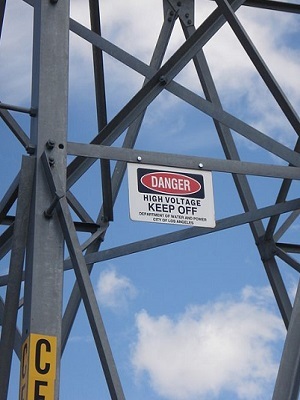Dangerous alterations to a defunct power plant in Robbins, allegedly including disconnected aircraft warning lights on a tower structure, disabled fire suppression systems, and cut, live wires left easily accessible, have prompted the owner of the property to file suit against two companies he allowed to remove equipment from the site.
The suit was filed July 31 in Cook County Circuit Court. The plaintiff, 134 Kedzie LLC, is suing Robbins Community Power LLC and Crossma Industry S.A. de C.V, a Mexican company.
According to the lawsuit, the power plant was constructed about 20 years ago as a state-of-the-art facility that generated electricity by incinerating household garbage. It closed down when operation became too costly, but it is still supplied with electricity from a nearby ComEd transformer.
134 Kedzie purchased the property in 2014. Though the sale included the industrial buildings on the property, some of the removable equipment inside the buildings was not included, and was sold to Crossma. Around the time of the closing on the property sale, Kedzie granted an easement to allow Robbins Community Power and Crossma access to the buildings to disassemble and remove that equipment. According to the lawsuit, the equipment purchase specifically excluded water and natural gas piping, all building-related structures, and any equipment that is required to keep the property code-compliant.
Court documents say Crossma began removing material from the site before the legal agreements were completed. When he learned of this, Robert Fletcher, the owner of 134 Kedzie, paid a visit to the site and was dismayed to find the company had overstepped the boundaries of the agreement and was disconnecting and removing vital safety equipment. Specifically, the suit states, the electrical supply line powering aircraft warning lights on a 385-foot-tall stack was cut, leaving the lights dark and not visible to aircraft. Water lines had also been cut, leaving the fire suppression systems crippled if not totally inoperable, and electrical systems had been removed from the buildings, leaving exit lights dark and sometimes leaving live wires exposed. Employees of Crossma and its subcontractors often fail to secure high-voltage areas, leaving them accessible and a danger to anyone who might enter the building, including emergency responders, as well as trespassers and vandals, the suit states.
134 Kedzie also claims Robbins and Crossma never obtained the liability insurance or local permits required to perform work on the site. The suit says Crossma has also told 134 Kedzie it intends to cut a hole in the roof of one building to remove a turbine not included in the equipment purchase, and has taken steps to open the roof despite Kedzie’s objections and the fact that the company does not have a municipal permit to perform roof removal.
The suit charges Robbins with breach of contract and breach of easement and with failure to comply with its legal agreements. It charges Crossma with conversion, for assuming control over life safety and electrical systems over which it had no rights, and with negligence.
The suit demands injunctive relief, that all systems be restored and that both companies be forced to comply with their agreements. It seeks reimbursement for court costs and unspecified damages, noting, “no monetary award can remedy the significant harm that will occur if a plane accidentally flies into the airspace over the premises and crashes into the [s]tack or an invitee, or possibly a first responder or trespasser, suffers serious bodily harm or injury or death due to the unsafe conditions” at the property.
134 Kedzie is represented by Jerome F. Buch and Christopher J. Harney of Seyfarth Shaw LLP.
